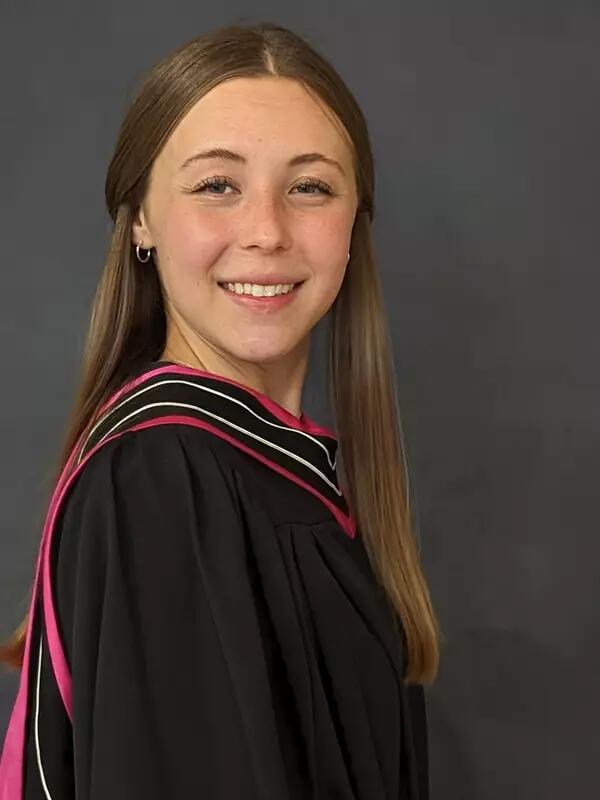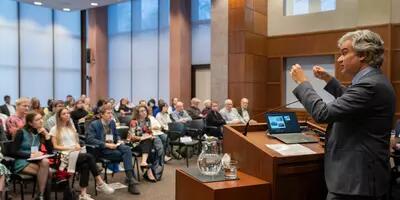
CERES MA Graduate Emma Patterson Receives the 2023 Janet Hyer Essay Prize
What has your life looked like since completing the MA?
I just finished the CERES MA in European, Russian, and Eurasian Affairs. I continued studying, even before graduation I started my PhD here at UofT in Slavic and East European Languages and Literatures. So, my life is still full of coursework! I’m continuing the same research I did in my master’s.
I am teaching Russian here at UofT, which I started while I was in my first year of CERES. That’s been a really great experience and I’m very happy to continue that.
What did you write your MRP on?
My research was quite multidisciplinary. I looked at Catherine the Second’ s memoirs. They’re originally in French but there are translations in Russian as well as a newer edition in English. She also revised them, so there are different versions of the same memoir that she went back and redacted. In these edits she changed details, emphasized different aspects of her life at Russian court.
What I did was I took physical descriptions she wrote of people in her court, mainly other European nobility—mostly German, or what would know be known as German, nobility—and I compared the visual portraits that I could find from artists at the time, to the verbal portraits Catherine described in her memoirs.
Coming up with a methodology for that was challenging but I was able to find this pseudoscience called physiognomy, which takes the proportions of people’s faces and assesses their character. According to this technique, the proportions of people’s faces and the features on their faces said something about their personalities. This was really common in the 18th century so it could be ascribed to her descriptions of people because of how widespread belief in this pseudoscience was.
I was using that to determine whether or not the painter’s interpretation of these individuals was similar to Catherine’s to see how honest she was as a narrator. People have credited her with being quite honest and very generous with her descriptions of things. She wanted people to see her as a rational, enlightened ruler. This was the argument of the essay—that the reason she wrote these memoirs and included such descriptions was because she wanted this level of credibility as an educated monarch.
Did you find a correlation between the verbal portraits and visual portraits?
Yeah! I would definitely say so! It was not a super strong correlation because, for example, ages between the verbal and visual portraits differed. But it was cool to look at to see how these people portrayed themselves, as they of course had some influence over how they were painted, versus how she depicted them.
The groupings were also quite interesting. People she wanted to be aligned with as a ruler she would describe more positively than those who she didn’t want to align with. She was a very strategic woman.
It was a lot to delve into, but I really enjoyed it!
How did you develop this idea?
I was taking a course on 18th century Russian literary criticism at UofT through the Slavic Department where we read her memoirs. I remember there was some sort of phrase about her dog or a whole story about her dog eating with her and her friends at the table. I love dogs so I thought, “Wow! I should read more into this.”
I found it really interesting how descriptive she was of people and her surroundings, so I thought I would take it further. It was my term paper for that course and then evolved into my MRP. The MRP ended up being much more different from the term paper than I thought it would be.
Who was your supervisor and how was the process of finding a supervisor for this project?
Professor Tatiana Smoliarova was and still is my supervisor. I had taken multiple courses with Professor Smoliarova and she was the one who pushed me to take my interest a little bit farther with this, especially when I was writing the term paper. She was very excited that someone was interested in this.
Which versions of Catherine’s memoir were you using or were you working with all three?
I worked with all three. I worked with the original French and the edits she made were only in the Russian version, so for those I used the Russian version. The English translation has a really good foreword which ended up being a big source of mine, but I didn’t use it for much of the content.
Were there notable differences in the descriptions between the three versions?
The descriptions were pretty constant throughout the three languages. It was time that changed things. In the different years that she went back and rewrote memoirs, she would just completely wipe away descriptions she included, include different people, take away a description, and add one years later that would depict someone differently. Especially Peter the Third, her descriptions of him changed a lot.
What was the research journey to get to this final product like?
It was very start up, on and off again. I was working a lot on it when I was doing the term paper. A very large chunk of time was spent on it then. So that was the year before the MRP. Then I submitted the MRP in August 2023, so I spent that whole summer deep-diving into these documents. Locating the different versions was difficult as they aren’t readily available, especially to North American universities. I ended up finding them online in different archives. They are mostly handwritten, not in type form, so I did a lot of sifting through digital archives. I had my sincerest doubts that the sources would be there, but they were. Also look at other scholars’ work and where they found materials. So, my advice is that they’re there! You have to stay motivated to find them.
Did you have any guiding questions or principles at the outset of your research and did they change as you further engaged with the material?
It started with me really wanting to see if we could trust Catherine II as a narrator of her own life. I was curious how manipulative she was of her readers. It seemed to me that her competing motive to appear educated and that she could write well kind of won out. After that, I questioned how I could take it farther, to an MRP length idea.
Then I started looking at the descriptions themselves and I thought, “These are very detailed. You could easily paint a picture with these.” So that was how it evolved into an art history concept as well as history and literature.
Had you ever engaged with art history prior to this?
This is one of Professor Smoliarova’s specialties, art history and literature, so I had some experience with it in class with her demonstrating how that connection is made, but I had never done it myself or taken an art history course. It was a new experience for me but it was fun!
Do you have any impressions on the idea of truth in Catherine II’s memoirs or trusting firsthand accounts in general?
It has definitely changed my perspective on trusting these sources. It’s very important that we only trust her on certain aspects. Court life in Russia, I think we can trust. She describes it very well. She is critical of Elizabeth’s court, and how Peter the III ran his court. Of her own agenda and descriptions of that, that’s where the motives get really murky, and we need some other accounts to actually be able to delve into that.
One literary device she uses in her memoirs is comedy. She satirizes a lot of men in politics, primarily, I would say, because her role as a woman was a bit contested. She uses comedic relief throughout her memoirs, and you’re kind of like “Okay, her dog is sitting with them at the table, that’s funny.” So it’s lighthearted but at the same time she’s calling other people outright rude things that if you heard anyone say today you’d think, “Wow!”
She made a very funny rude remark about another woman at court, and she said something along the lines of “This is not a good person and it’s reflected in her physical appearance.” Very classy.
What does this prize mean to you?
It means a lot! I was so surprised. I worked very hard on my MRP, and I was very proud of it. When I was done writing, I had all my family members read it and of course they’ll tell me it’s great because they know how much effort I put into it, but to have that recognized by CERES was a very good affirmation. Since I’m continuing my studies, it was very nice to have that recognition and I’m sure it couldn’t have been an easy thing to award because I know everyone put such hard work into their MRPs.
Has this topic inspired you in your future studies?
I’m still hoping to continue this in some way, just not sure in what direction. I really enjoy working with 18th century literature and looking at how it developed in Russia and the Slavic world, and the influences of different governments on the evolution of literature. I’m really hoping to make it a little more multinational, focusing on other Slavic countries as well, not just Russia. I’ve got a few years to work on that, thankfully!

